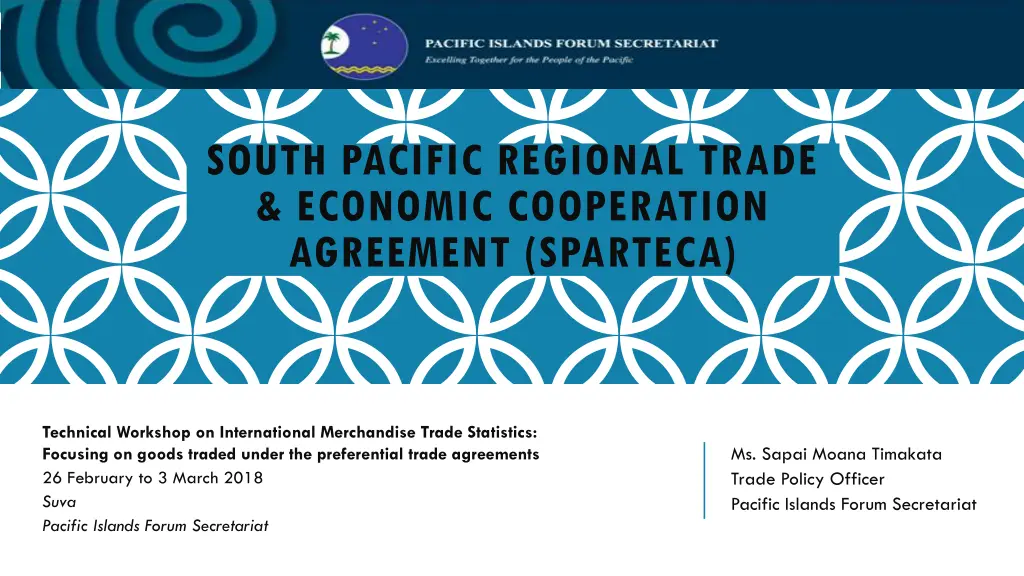
SPARTECA Regional Trade Agreement: Key Aspects and Requirements
Explore the details of the South Pacific Regional Trade & Economic Cooperation Agreement (SPARTECA), focusing on preferential trade benefits, rules of origin, and concessionary access for goods traded within the Pacific region. Learn about the impact on the Textile, Clothing, and Footwear (TCF) industry in Fiji and the essential procedural aspects of the agreement.
Download Presentation

Please find below an Image/Link to download the presentation.
The content on the website is provided AS IS for your information and personal use only. It may not be sold, licensed, or shared on other websites without obtaining consent from the author. If you encounter any issues during the download, it is possible that the publisher has removed the file from their server.
You are allowed to download the files provided on this website for personal or commercial use, subject to the condition that they are used lawfully. All files are the property of their respective owners.
The content on the website is provided AS IS for your information and personal use only. It may not be sold, licensed, or shared on other websites without obtaining consent from the author.
E N D
Presentation Transcript
SOUTH PACIFIC REGIONAL TRADE & ECONOMIC COOPERATION AGREEMENT (SPARTECA) Technical Workshop on International Merchandise Trade Statistics: Focusing on goods traded under the preferential trade agreements 26 February to 3 March 2018 Suva Pacific Islands Forum Secretariat Ms. Sapai Moana Timakata Trade Policy Officer Pacific Islands Forum Secretariat
SUMMARY SPARTECA - A non-reciprocal trade agreement, with the textiles, clothing and footwear industry as major beneficiaries. Key benefits of SPARTECA for the Pacific Islands: Primarily in the Textile, Clothing and Footwear (TCF) Industry Case Study: FIJI Period 1991 1996: TCF exports from Fiji to Australia grew by 340%. Australia accounted for half of total TCF Fiji exports. In 1995, TCF industry represented 22.4% of total exports, 9% of GDP and employed 13,000 people. Currently over 85% of Fiji s TCF exports are to Australia employing 5,500 workers SPARTECA Entered into force 1 Jan 1981 PICTA PACER+ MSG-TA
PREFERENTIAL ACCESS/TREATMENT To qualify for concessional access, goods must meet the rules of origin set out in SPARTECA (50 per cent minimum content from SPARTECA parties). SPARTECA ROO - goods being unmanufactured raw products/wholly obtained - goods wholly or partly manufactured in the FIC using VALUE ADDED APPROACH - good to qualify under value added approach, the LAST process in the manufacture of the goods must be performed in a FIC and qualifying expenditure incurred by the manufacturer in respect of the goods is not LESS than 50% of the factory works cost of the goods in the finished state.
ARTICLE III: Schedules of Concessions 1. Subject to the provisions of the Agreement, the Government of Australia: a) permit the duty free and unrestricted entry of goods listed in Schedule1 that originate in and are imported from FICs b) permit the entry of goods listed in Schedule 2 to this Agreement that originate in and are imported from Forum Island countries, subject to the duties and quantitative limits specified in that Schedule 2. Subject to the provisions of this Agreement the Government of New Zealand shall permit the duty free and unrestricted entry of all goods wholly obtained or partly manufactured in the territory of a Forum Island country, except those goods listed in Schedule 3
SPARTECA's importance has declined due mainly to the erosion of tariff preferences, with Australia and New Zealand reducing MFN rates unilaterally, as well as restrictive rules of origin. PACER-Plus is expected to subsume SPARTECA once the Agreement has been ratified by more than seven countries.
COUNTRY EXPERIENCES Experiences from SPARTECA application: Significant problems in meeting stringent ROO criteria (50% LAC) Some FICs exporting only small quantities of products to Australia and NZ but may not be claiming preferences under the SPARTECA (e.g. Niue) Despite the proximity of Australia and New Zealand to many FICs, significant trade has not been developed SPS and NTBs are hindrances to trade of potential FIC products e.g. consignments of copra cake from one SIS had to be retreated at substantial additional costs due to bio-security issues General lack of awareness of SPARTECA at the regional level so private sector were not aware of what was available [MARK ONE APPAREL EXPERIENCE TRADING UNDER SPARTECA]
